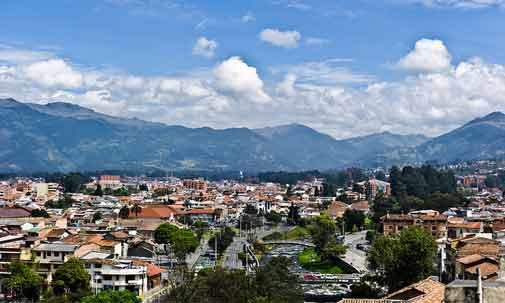One morning at 7:45, when I was waiting for a bus in my adopted hometown of Cuenca, Ecuador, a shaggy street dog jumped up onto the bench beside me. It made me comfortable, because I’ve been a “dog person” all my life. It was also clear the dog was just tolerating me on what was clearly his bench.
Minutes later, an expat with a graying ponytail sauntered over and suddenly the dog jumped to life. “Is this your dog?” I asked. With a smile, Dennis McMackin answered, “No. This is Ivo, and he’s a street dog but also my friend. We meet here every day at 7:45 a.m. and go for a walk together.”
Dennis, a retired upper manager for a big construction company in Florida, was quick to admit that these meetings, which have been taking place for around six years, have become the high point not only of his own daily life, but likely Ivo’s, as well.
Besides being a die-hard “dog person,” Dennis has something else in common with me. He moved to Ecuador to retire and live a more stress-free life. He chose Cuenca because he loved the climate, the low cost of living, a culture that embraced music and art, and the beauty of the Spanish colonial and French architecture in its historic downtown.
Friendships like the one I’ve developed with Dennis are important. No matter where you go, you need to know that a few people have got your back. It’s not hard to find friends, especially when you realize that your personal interests are what bind you to others, whether these interests are hiking, playing poker, going to church, or volunteering together. It helps that there are a lot of activities to engage your passions in Cuenca. By finding like-minded individuals, we develop a network of people who can pick us up when we’re down, invite us over for holidays, laugh with us over lunch, or whom we can call in an emergency.
When he arrived in Cuenca, Dennis made fast friends with an expat neighbor and his dog, and they walked together daily, exploring the city. But when his friend returned to the U.S., Dennis felt the loss of that companionship. Happily, one part of that formula could be replaced.
“I met Ivo through my wife, Sandra, who sometimes volunteered at the vet’s office. She knew I needed a new friend and so did Ivo. So that’s how we started our routine,” adds Dennis.
Because Dennis lives in a condo that prohibits pets, the two developed a different approach: Meet at 7:45 each morning, walk along the Tomebamba River, have lunch in town, then walk back to the vet’s office, where the dog now has an indoor place to sleep. “Ivo gave me a sense of purpose—a reason to get out of bed,” says Dennis. “We needed each other.”
The “reason to get out of bed” statement strikes a chord with me. With scenic beauty, affordable cost of living, and great public health care, Cuenca is a joyous and safe place to land. But, as with anywhere, in Cuenca the difference between living there and making it your home is up to you.
Like Dennis, I don’t feel at home without dogs in my life, so my husband and I brought all five of our canine companions when we moved here. My bed is king size: large enough to hold my dogs, my husband Rowland, and myself.
My bedroom here is almost exactly like the one we had in Florida. I’ve loaded up with internet, which affords me such guilty pleasures as watching The Bachelor or falling asleep to Forensic Files. And I spend hours reading People and Vanity Fair on my iPad. The big difference now is that I look out my bedroom window to great views of downtown Cuenca and the Andes Mountains.
Bringing our dogs with us was bringing the part of home that we couldn’t do without. But making your new home exactly that—home—also means reaching out to the neighborhood around you and embracing it.
Part of blending with the neighborhood included learning the language. I have taken Spanish for the four years I’ve lived here. Still, my dogs probably know more Spanish words than I do. But conversing, even with my rudimentary skills, gives me the opportunity to embrace my Ecuadorian neighbors. They don’t mind my feeble skill level. They appreciate and respect that I try, and together we play charades and get by. Taking Spanish classes also connected me with new friends who had things in common with me, like commiserating over our poor pronunciation. Soon we were taking bus trips together to nearby towns, or chatting at lunch.
But sometimes, when I just need to be alone to reflect, I go to Parque Calderón. That’s the main town square in Cuenca, where I enter a 140-year-old cathedral with an awe-inspiring, gold sanctuary to listen to Catholic liturgical chants that are familiar in any language. Then I go next door to an heladería (ice cream shop) and grab a single-dip, mint chocolate chip cone and carry it to the park to eat among playing children.
Some things never change, no matter where you live—ice cream dripping down my arm is one of them. And finding comfort in your new surroundings can be something as simple as just petting a dog—like Ivo—and meeting folks like Dennis, who remind us that you can find happiness in your new home. You just need to reach out for it.

